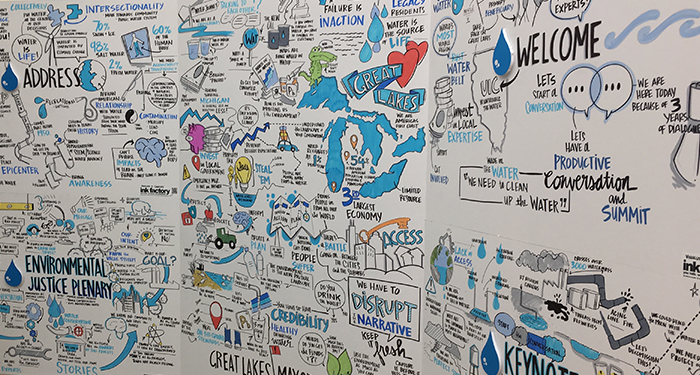
Freshwater Lab illustrated poster recording conversations from the biannual summit.
So many good things happen at UIC. Even as the Spring 2017 Semester came to an end, the campus was vibrant with activities sponsored by Freshwater Labs, and the Jane Addams Hull-House Museum.
On May 10 -11, the Freshwater Lab at UIC, directed by Professor Rachel Havrelock, sponsored a summit to focus on water issues facing the Great Lakes Region. The Freshwater Labs is a project of UIC’s Institute for the Humanities. Policy makers, researchers, activists, and indigenous leaders from throughout the Great Lakes Region gathered to discuss water quantity and quality and covered a range of topics including the diminishing supply of the world’s freshwater, aging oil pipelines, lead contamination, water delivery and filtration systems, municipal finance, privatization of public water supplies, green infrastructure, hydraulic fracturing, impacts of emergency management laws, etc.
The opening keynote was delivered by Maude Barlow, National Chairperson, Council of Canadians, who has written and worked extensively to promote water as a human right. Denise Abdul-Rahman, Environmental Climate Justice Chair, spoke about the work of NAACP Indiana. Day One also included a panel on environmental justice led by Antonio Lopez of the Little Village Environmental Justice Organization (LVEJO) and a panel of mayors from Toledo, Benton Harbor, Racine, Gary, Milwaukee, and Inkster, Michigan who discussed pressing issues and strategies at the local level.
Great Cities Institute Director, Teresa Córdova, provided opening comments on Day 2 highlighting the various themes that emerged during Day One, bringing focus to the importance of the public good – and of water as a public good; water as sacred and as a gift of Mother Earth; and the challenges and responsibilities of stewardship of the Great Lakes. In her comments, Teresa also took note of the incredible assembly of knowledgeable and committed individuals and organizations and emphasized how critical their role was to the future of the region.
The remainder of Day two was spent in working groups on the following topics: Water Costs and the Human Right to Water; Great Lakes Digital Storytelling; Environmental Justice Campaign Messaging, Story Production and Grassroots Media; Oil Pipelines and the Great Lakes; Water Delivery and Lead Pipes; and Can We Be Good Water Neighbors? – Culture, Place and Watershed Politics. The day ended with a closing ceremony.
On Friday, May 12, The Jane Addams Hull-House Museum, directed by Jennifer Scott, with assistance from UIC’s Institute for the Humanities, directed by Susan Levine, sponsored a panel on the Common Good. Participants were UIC faculty from Social Work (Cassandra McKay-Jackson, Health Policy Administration (Patricia O’Brien), Occupational Therapy (Kathy Preissner), Nursing (Teresa A. Savage), and Latin American and Latino Studies (Amalia Pallares). This event was the culmination of a yearlong series. The National Endowment for the Humanities funded the project for non-humanities faculty from UIC to “explore Progressive Era frameworks, the history and philosophies of public services, and the role of the state in citizens’ lives. The purpose of the seminar was to explore the significance and legacy of the ‘Common Good,’ a topic more resonant than ever.” The notion of “citizen,” of course, was defined broadly and true to the Hull House legacy of serving immigrant communities.
GCI Director, Teresa Córdova, offered opening comments and then moderated the panel. She spoke about the role and responsibility of government in providing public goods and services. Drawing upon readings on the public good, she stated that discussions of the common good requires moral judgments about the role, as well as the scope, of government in serving its citizenry (defined broadly). Citing a blog from The Rock Ethics Institute she said, “a decreased prioritization of public goods is in effect a diminished sense of social responsibility among citizens.” It is that diminished sense of commitment to one another, she argued, that is so dangerous to us as a society and allows the festering of hate, scapegoating and disregard for life and future generations. A yearlong study of The Progressive Era framework provides the opportunity to reaffirm values of moral obligation to one another. Professor Córdova concluded that we should not shy away from having those tough conversations about what it takes to assure our common good.


